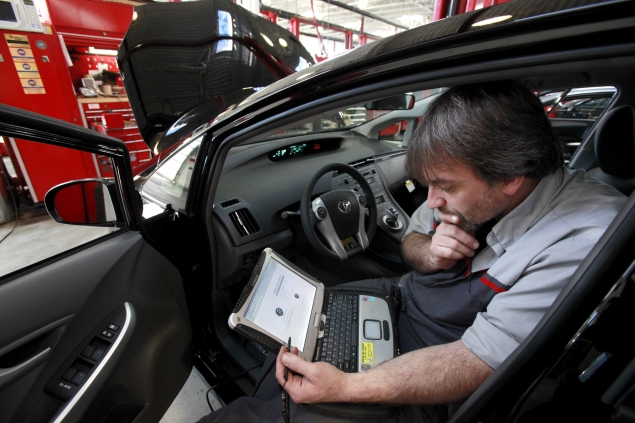- Home
- Internet
- Internet News
- Wi Fi in cars a bad idea: Research
Wi-Fi in cars a bad idea: Research

"Many people assume that talking to a voice-operated device will be as safe as using a hands-free cell phone, but neither activity is safe," said Professor Ian Spence, Department of Psychology at the University of Toronto, and author of the new study.
The study raises safety concerns about plans announced last month by Canadian telecommunications company Rogers Communications, along with US provider Sprint Corporation for providing high-speed Internet access in vehicles.
In the study, Spence and a team of researchers asked subjects to perform an attentional visual field test in which they repeatedly identified the random location of an object in visual clutter displayed on a computer monitor.
Poor performance on the test is known to be a good predictor of unsafe driving. Subjects performed the test while carrying out a range of listening and/or speaking tasks or in silence.
An example of an easy task was listening to recordings of news items, much like listening to a car radio. More difficult tasks required subjects to answer simple yes-no questions while performing the visual test.
Subjects answered by either speaking out loud in some experimental conditions, or merely thinking of the answer in others. The most-demanding questions required subjects to take the last letter of a presented word (eg apple) and speak another word beginning with that letter (eg elephant).
Subjects who completed the test of visual attention coupled with the listening/speaking tasks were as accurate as those who completed the visual test in silence.
However, they responded much more slowly as the difficulty increased ? as much as one second slower with the most demanding tasks.
"It did not matter whether the subject spoke the answer aloud or simply thought about the answer. It was the thinking, not speaking, that caused them to slow down," said Spence.
"At 50 kilometres per hour, a car travels 13.9 metres in one second. A driver who brakes one second earlier than another driver to avoid a collision, will either prevent it completely or be travelling more slowly when it occurs, lowering the probability of severe injury or fatality," Spence added.
"A delay in braking by as much as one second presents a significant threat to safe driving and casts doubt on the belief that hands-free voice-controlled devices reduce driver distraction," Spence said.
The study appears in the journal Applied Cognitive Psychology.
Get your daily dose of tech news, reviews, and insights, in under 80 characters on Gadgets 360 Turbo. Connect with fellow tech lovers on our Forum. Follow us on X, Facebook, WhatsApp, Threads and Google News for instant updates. Catch all the action on our YouTube channel.
Related Stories
- Samsung Galaxy Unpacked 2026
- iPhone 17 Pro Max
- ChatGPT
- iOS 26
- Laptop Under 50000
- Smartwatch Under 10000
- Apple Vision Pro
- Oneplus 12
- OnePlus Nord CE 3 Lite 5G
- iPhone 13
- Xiaomi 14 Pro
- Oppo Find N3
- Tecno Spark Go (2023)
- Realme V30
- Best Phones Under 25000
- Samsung Galaxy S24 Series
- Cryptocurrency
- iQoo 12
- Samsung Galaxy S24 Ultra
- Giottus
- Samsung Galaxy Z Flip 5
- Apple 'Scary Fast'
- Housefull 5
- GoPro Hero 12 Black Review
- Invincible Season 2
- JioGlass
- HD Ready TV
- Latest Mobile Phones
- Compare Phones
- Tecno Pova Curve 2 5G
- Lava Yuva Star 3
- Honor X6d
- OPPO K14x 5G
- Samsung Galaxy F70e 5G
- iQOO 15 Ultra
- OPPO A6v 5G
- OPPO A6i+ 5G
- Asus Vivobook 16 (M1605NAQ)
- Asus Vivobook 15 (2026)
- Brave Ark 2-in-1
- Black Shark Gaming Tablet
- boAt Chrome Iris
- HMD Watch P1
- Haier H5E Series
- Acerpure Nitro Z Series 100-inch QLED TV
- Asus ROG Ally
- Nintendo Switch Lite
- Haier 1.6 Ton 5 Star Inverter Split AC (HSU19G-MZAID5BN-INV)
- Haier 1.6 Ton 5 Star Inverter Split AC (HSU19G-MZAIM5BN-INV)







![[Partner Content] OPPO Reno15 Series: AI Portrait Camera, Popout and First Compact Reno](https://www.gadgets360.com/static/mobile/images/spacer.png)









